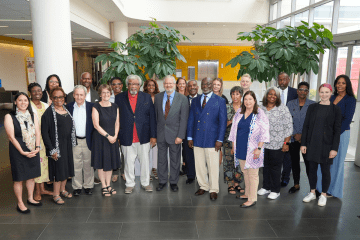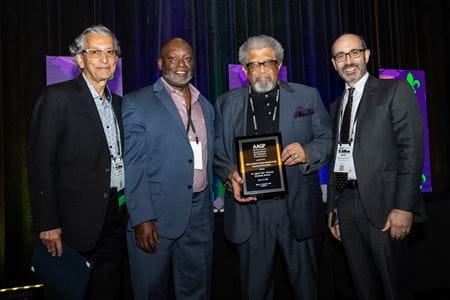At Indiana University School of Medicine, dozens of researchers are continuously working to better understand Alzheimer’s disease. From learning about symptoms and discovering how they progress to navigating each tangle formed from detached tau molecules in the brain—experts in Indiana are working to effectively treat and prevent a disease that continues to impact more and more lives each year.
Since its establishment over 30 years ago, the Indiana Alzheimer’s Disease Research Center (IADRC) has worked to understand not just the disease but the lives it impacts. To help with this, the IADRC established a Community Advisory Board (CAB), led by community leaders throughout Indianapolis.
Many of these local experts have not only been personally affected by Alzheimer’s, but they also go to the same grocery stores, attend the same churches and live next door to people throughout Indianapolis who have either felt overwhelmed by the idea of finding answers about this disease or have been kept out of important conversations on how Alzheimer’s can change their life.
“The CAB has worked to educate communities of color about Alzheimer's and emphasized the importance of research,” said Denise Jones, a member of CAB. “This work with IADRC and CAB has made a significant positive impact on individuals' lives to make informed decisions about their own health and advocate for their overall well-being.”
Led by a spirit of compassion and a desire to educate, CAB has spent years connecting the dots between research and community. Their work begins with educating families and ensuring the scientific information is understandable for those who aren’t scientists. In fact, their work has helped the IADRC increase its research participation to over 20 percent among Black and African American individuals. Big steps like these are helping create trust between the community and Alzheimer’s disease research, a necessity when it comes to improving representation for Black and Brown folks in research and improving their health outcomes.
“Mollie and I are proud to leave a legacy of optimism to those who are experiencing the silent epidemic that inflicts chaos on families, friends and caregivers of those who have been robbed of their memories. We are encouraged by the advances in research that give hope for the future," said Ralph Richards, who is co-chair of the CAB and speaks nationally—alongside his wife, Mollie— about the significance of Black participation in Alzheimer’s research.
CAB recently gained national attention when it became the recipient of the 2023 American Association of Geriatric Psychiatry (AAGP) Diversity Award, which recognizes “an individual or organization for special service or attention to the mental healthcare needs of elderly minority or under-served populations” Not only is this a notable achievement for the CAB, but it’s a testament to years of linking a community in need of resources with a center built on the idea of exploring and innovating Alzheimer’s research.
the recipient of the 2023 American Association of Geriatric Psychiatry (AAGP) Diversity Award, which recognizes “an individual or organization for special service or attention to the mental healthcare needs of elderly minority or under-served populations” Not only is this a notable achievement for the CAB, but it’s a testament to years of linking a community in need of resources with a center built on the idea of exploring and innovating Alzheimer’s research.
"I am greatly pleased that IADRC, with the help of the CAB, has a spirit of compassion and commitment for the inclusive research that is required to treat and prevent a disease that impacts so many lives and families,” said Chris Campbell, a local pastor and co-chair of the CAB. “The recognition of a global organization like AAGP is further confirmation that IADRC and the CAB recognize the inclusion of the faith-based community as essential in the effort to foster trust and improvement of representation for minorities and the underserved population."
AAGP recognized the dedication and significant role of each CAB member and how their efforts have played a huge role in Alzheimer's disease research, providing education to diverse communities through the IADRC and its affiliated grants, community organizations and partners. AAGP also recognized the need to use creative approaches when connecting with underserved communities about Alzheimer's disease, especially for research participation.
Over the summer, CAB members and IU School of Medicine researchers joined to celebrate the award and share why their work is significant. Together their stories and efforts are transforming how IU School of Medicine researchers communicate their research findings to the community. With guidance from the CAB, the IADRC is excited to focus on education and equity in the years to come as an effective tool when bonding with a community that makes their work possible.
“Our Community Advisory Board has done a tremendous job bridging our diverse communities to the IADRC faculty and staff,” said Sophia Wang, MD, Wesley P. Martin Scholar in Alzheimer’s Education and leader for the Outreach, Recruitment and Engagement Core at the IADRC. “These years of work have led to a major milestone in diverse participation in more than 30 years of IADRC. We anticipate other milestones as we continue to build our efforts in the Black and Brown communities and engage other communities, including Hispanic older adults. With the recent FDA approval of a disease-modifying agent for Alzheimer's disease, our mission to achieve equity and inclusion in our research is more urgent than ever.”
Learn more about CAB and the Indiana Alzheimer’s Disease Research Center.
